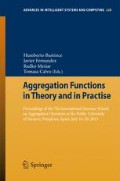Abstract
Aggregation functions, on one hand, and implication functions, on the other, play different although important roles in the field of fuzzy logic. Both have been intensively investigated in the last years, revealing the tide relationship that exists between them. The present work reviews the most relevant aspects of this relation, which most of the times also involves negation functions. In addition to the well-known use of aggregation and negation functions to build and to characterize implication functions, we analyze how new families of aggregation functions and negation functions can be obtained from implications, and we recall the main equations and inequations involving these three classes of functions.
Access this chapter
Tax calculation will be finalised at checkout
Purchases are for personal use only
Preview
Unable to display preview. Download preview PDF.
References
Aguiló, I., Carbonell, M., Suñer, J., Torrens, J.: Dual representable aggregation functions and their derived S-implications. In: Hüllermeier, E., Kruse, R., Hoffmann, F. (eds.) IPMU 2010. LNCS, vol. 6178, pp. 408–417. Springer, Heidelberg (2010)
Alsina, C., Frank, M., Schweizer, B.: Associative functions. World Scientific, Singapore (2006)
Baczynski, M., Beliakov, G., Bustince, H., Pradera, A. (eds.): Adv. in Fuzzy Implication Functions. STUDFUZZ, vol. 300. Springer, Heidelberg (2013)
Baczyński, M., Jayaram, B.: Fuzzy Implications. Springer, Heidelberg (2008)
Beliakov, G., Pradera, A., Calvo, T.: Aggregation Functions: A Guide for Practitioners. Springer, Heidelberg (2007)
Carbonell, M., Torrens, J.: Continuous R-implications generated from representable aggregation functions. Fuzzy Sets and Systems 161(17), 2276–2289 (2010)
De Baets, B., Fodor, J.: Residual operators of uninorms. Soft Comput. 3(2), 89–100 (1999)
Demirli, K., De Baets, B.: Basic properties of implicators in a residual framework. Tatra Mountains Mathematical Publications 16, 31–46 (1999)
Durante, F., Klement, E., Mesiar, R., Sempi, C.: Conjunctors and their residual implicators: Characterizations and construction methods. Mediterranean Journal of Mathematics 4, 343–356 (2007)
Fodor, J.: On fuzzy implication operators. Fuzzy Sets and Systems 42, 293–300 (1991)
Fodor, J.: A new look at fuzzy connectives. Fuzzy Sets and Systems 57, 141–148 (1993)
Fodor, J., Roubens, M.: Fuzzy preference modelling and multicriteria decision support. Kluwer Academic Publishers (1994)
Grabisch, M., Marichal, J., Mesiar, R., Pap, E.: Aggregation Functions. Cambridge University Press (2009)
Klement, E., Mesiar, R., Pap, E.: Triangular Norms. Kluwer, Dordrecht (2000)
Mas, M., Monserrat, M., Torrens, J.: Two types of implications derived from uninorms. Fuzzy Sets and Systems 158(23), 2612–2626 (2007), doi: http://dx.doi.org/10.1016/j.fss.2007.05.007
Mas, M., Monserrat, M., Torrens, J.: A characterization of (U, N), RU, QL and D-implications derived from uninorms satisfying the law of importation. Fuzzy Sets and Systems 161(10), 1369–1387 (2010)
Mas, M., Monserrat, M., Torrens, J., Trillas, E.: A survey on fuzzy implication functions. IEEE T. Fuzzy Systems 15(6), 1107–1121 (2007)
Ouyang, Y.: On fuzzy implications determined by aggregation operators. Information Sciences 193, 153–162 (2012)
Pradera, A., Beliakov, G., Bustince, H., Fernández, J.: On (TS,N)-fuzzy implications. In: Proceedings of 6th International Summer School on Aggregation Operators, pp. 93–98 (2011)
Pradera, A., Beliakov, G., Bustince, H., Galar, M., Bedregal, B.: Fuzzy implications seen as (A,N)-implications (submitted)
Ruiz-Aguilera, D., Torrens, J.: Residual implications and co-implications from idempotent uninorms. Kybernetika 40(1), 21–38 (2004)
Ruiz-Aguilera, D., Torrens, J.: Distributivity of residual implications over conjunctive and disjunctive uninorms. Fuzzy Sets and Systems 158(1), 23–37 (2007)
Ruiz-Aguilera, D., Torrens, J.: S- and R-implications from uninorms continuous in ]0, 1[2 and their distributivity over uninorms. Fuzzy Sets and Systems 160(6), 832–852 (2009)
Torra, V., Narukawa, Y.: Modeling Decisions: Information Fusion and Aggregation Operators. Springer (2007)
Yager, R.: Modeling holistic fuzzy implication using co-copulas. Fuzzy Optim. and Decis. Making 5, 207–226 (2006)
Author information
Authors and Affiliations
Corresponding author
Editor information
Editors and Affiliations
Rights and permissions
Copyright information
© 2013 Springer-Verlag Berlin Heidelberg
About this paper
Cite this paper
Pradera, A. (2013). A Review of the Relationships between Aggregation, Implication and Negation Functions. In: Bustince, H., Fernandez, J., Mesiar, R., Calvo, T. (eds) Aggregation Functions in Theory and in Practise. Advances in Intelligent Systems and Computing, vol 228. Springer, Berlin, Heidelberg. https://doi.org/10.1007/978-3-642-39165-1_6
Download citation
DOI: https://doi.org/10.1007/978-3-642-39165-1_6
Publisher Name: Springer, Berlin, Heidelberg
Print ISBN: 978-3-642-39164-4
Online ISBN: 978-3-642-39165-1
eBook Packages: EngineeringEngineering (R0)

